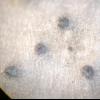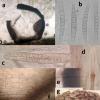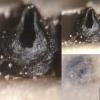
05-07-2025 12:38
Åge OterhalsI found this pyrenomycetous fungi in pine forest o

04-07-2025 20:12
Hello.A fungus growing on the surface of a trunk o

20-06-2025 08:33
Hello.Small, blackish, mucronated surface grains s

28-06-2025 16:00
Hello.A tiny fungus shaped like globose black grai

04-07-2025 12:43
me mandan el material seco de Galicia (España)

03-07-2025 18:40
me mandas el material seco de Galicia (España) re

03-07-2025 20:08
 Francois Guay
Francois Guay
I found this interesting yellowish asco growing on

01-07-2025 23:37
Hello.A Pleosporal symbiotic organism located and
"Leptosphaeria" cf. acuta on Urtica dioica
Christoph Hahn,
18-04-2020 01:44

Dear all,
I collected (15.04.2020) a dry stem of Urtica dioica (var. longifolia) with tiny black dots and young Aporhytisma urticae in Mammendorf, Bavaria, Germany. I was curious, if the tiny black dots could be Phoma acuta (i. e. Leptosphaeria doliolum) or Phoma piskorzii (i. e. "Leptosphaeria" acuta). And it's so extremely dry at the moment, I was glad to find even theses black dots ;-).
Well, I was surprised to see a lot of asci, many spores. So, the dots are Perithecia, o.k. They are immersed in the host tissue, just the tips are visible - see first figure as attachment.
"Leptosphaeria acuta" begins immersed, so that shouldn't be a problem. But... the spores are quite big: 50.5-56-62 x 6.75-7.2-7.75 µm (water, alive) and with 9-13 (!) septae, turning somehow greenish in Lugol (second figrue "b" alive in water as b/w, better contrast).
Asci up to 160 x 13 µm (water, alive, second figure "c"), bitunicate, with basal crozier, inamyloid - but plasma in Lugol red, so there should be some gylcogene in the plasma (second figure "d" - both parts of "d" are in Lugol).
Width of Paraphyses at the base up to 3.5 µm, tapering to 1.5 µm, septate, branched.
Excipulum width up to 30 µm (fig. 2 "e"), excipulum cells not reacting red in Lugol.
Why "Leptosphaeria" cf. acuta? The spores have a lot of septae. And they are longer than expected. And I thought, the excipulum should react red, too, in Lugol, not only the Plasma of young Asci. I am not sure, "Leptosphaeria" acuta could be a small aggregate.
So I would like to ask, if my doubts were a kind of splitting paranoia or justified.
Thanks in advance for your help,
Christoph
Christoph Hahn,
18-04-2020 01:48
Alain GARDIENNET,
18-04-2020 07:36
Re : "Leptosphaeria" cf. acuta on Urtica dioica
Hi,
Lennart Holm, which studied a lot of Leptosphaeria species, gave : 45-54 x 4,5-7 µm, 8-13 septate. It could fit almost well.
No idea concerning Lugol reaction.
Alain
Christoph Hahn,
18-04-2020 21:31

Re : "Leptosphaeria" cf. acuta on Urtica dioica
Dear Alain,
thanks a lot!
Greetings,
Christoph



